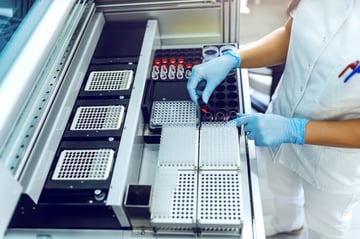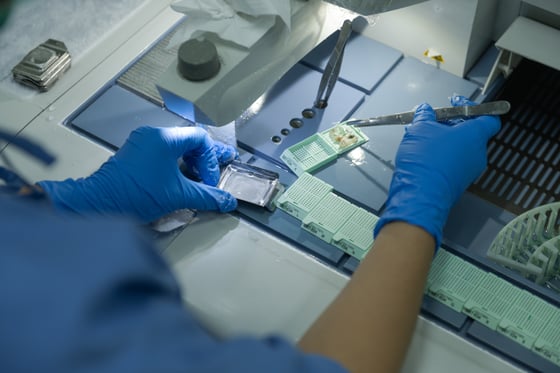
Pediatric Drug Development Services
Pediatric Sample Capabilities and Special Handling
New drugs which are intended for use in a pediatric population must be tested and properly evaluated for use in pediatric patients. Pediatric subjects can respond to drugs differently than adults, and we are addressing both unique challenges in pediatric clinical trials and the needs of the patients. Obtaining quality samples with enough volume for testing from very young pediatric subjects can be difficult, and tests might be canceled if a low volume sample is received in a clinical laboratory. At IQVIA Laboratories, our mission is to treat each sample as if a life depends on it. We have established policies and procedures specifically tailored for pediatric sample collection, handling, and testing to assure the best chance for reliable results on very low volume samples.
Pediatric Solutions: Precise Low Volume Blood Sample Requirements
It is often necessary to minimize the volume of blood taken from very young pediatric subjects, especially when patients may have multiple blood draws over relatively short periods of time. Our scientists use micro-sampling capabilities in our state-of-the-art chemistry, immunochemistry, and hematology analyzers. This allows us to minimize overall serum or whole blood volume requirements. Additionally, we have developed a unique 12-analyte short sample chemistry panel for sub-optimal volume samples submitted for chemistry panels with more analytes. This panel includes all chemistry analytes that could potentially have a critical value as well as liver and kidney function safety markers. This option is available for pediatric subjects younger than 7 years old, where low volume chemistry samples will be submitted to our laboratories in a special 2.0 mL graduated serum transport vial. A similar option is available for hematology or CBC samples, where trained laboratorians manually manipulate a very low volume sample to obtain accurate CBC results, if needed.
Standardized SOPs used globally across our labs for routine testing detail special handling needed for low volume pediatric samples. Both chemistry and immunochemistry samples can be transferred to specially designed micro sample cups that, along with special instrument programming, minimize the volume required on automated instruments to obtain accurate results.
Recommended minimum blood volumes by age group
| Patient Age Group | Chemistry Panel* (20 analytes) WHOLE BLOOD |
Chemistry Panel* (20 analytes) SERUM |
Hematology (CBC) |
TOTAL Whole Blood Volume |
|---|---|---|---|---|
| < 2 years old | 1.1 mL | 0.5 mL** | 0.6 mL | 1.7 mL |
| 2 to 6 years old | 2.6 mL | 1.1 mL | 1.2 mL | 3.8 mL |
| > 6 years old | 3.5 mL | 1.4 mL | 2.0 mL | 5.5 mL |
*Routine serum safety chemistries only — additional tests like thyroid, sex, or growth hormone markers may require additional serum.
**Minimum volume requirements — may not be enough to repeat/confirm abnormal results.
Specialized blood collection supplies for pediatric subjects
We have experience with many different blood collection devices, and work with our clients on the best combination of blood draw equipment and tubes tailored to both their study requirements and test capabilities. The system we recommend using combines the control provided by a syringe and 23g butterfly needle together with the clot activators and/or anticoagulants commonly available in evacuated blood tubes, allowing for gentle blood collection using a controlled aspiration technique for difficult pediatric draws.
Pediatric services: study set up and age-specific blood collection kits
Age-specific blood draw kits are configured based on pediatric subject age range (<2 years, 2-6 Years, or 7-12 years), with blood drawing supplies configured to optimize and minimize the amount of blood drawn based on the age group and test mix or complexity.
Related Services

Central Laboratory Services
Learn more
Assay Development Services
Learn more
Biomarker Testing Services
Learn more
Cell and Gene Therapy Solutions
Learn more
Clinical Laboratory Services
Learn more
Immunoassay Services
Learn more
Lab Data Management Solutions
Learn more
Clinical Laboratories Project Management & Site Support
Learn more
Biomarker Development Services
Learn more



